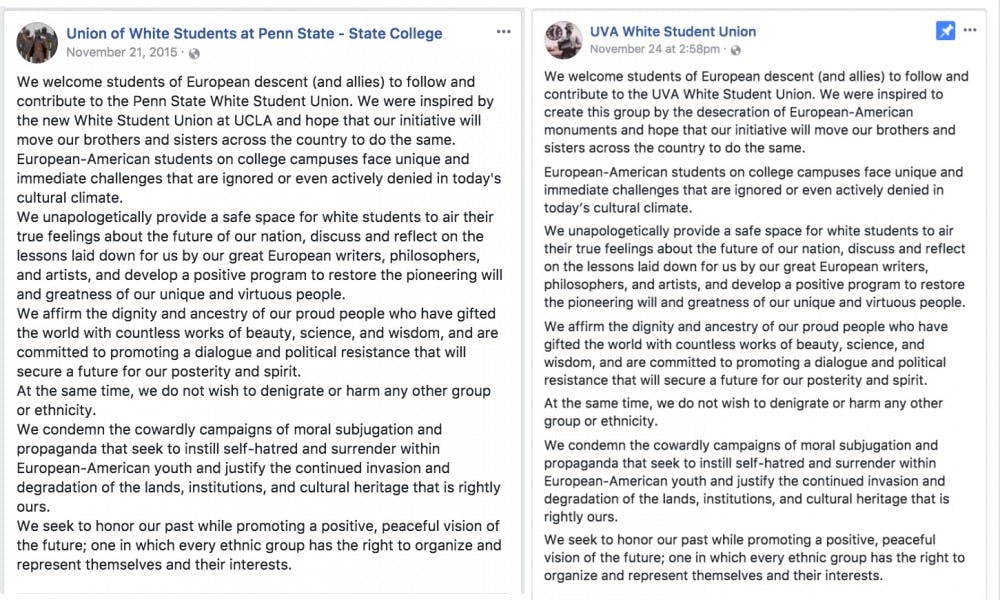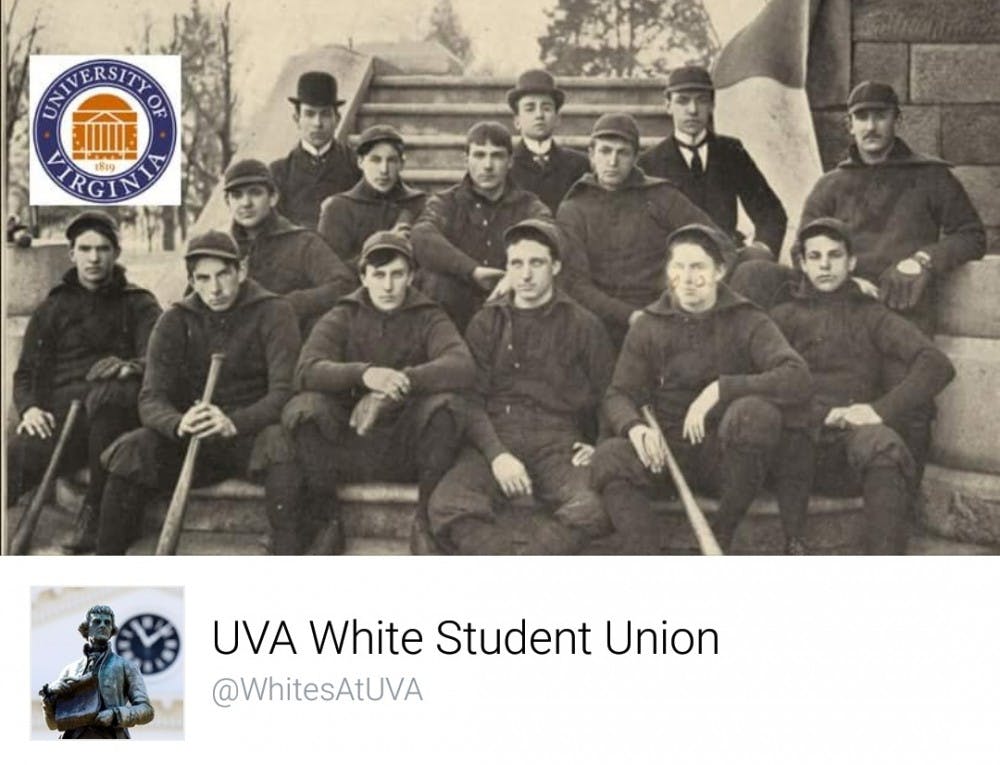A Facebook page entitled “UVA White Student Union” appeared last Friday and has drawn student backlash on social media.
It is currently unclear who exactly is running the Facebook page, but it appears to be similar to hoax pages that were created in 2015 by white supremacists who attempted to “troll” over 30 colleges and universities. Although the page claims affiliation to the University of Virginia, those who have commented support on its posts do not appear to be University students and some of the accounts appear to hold white nationalist affiliations.
The page claims to “unapologetically provide a safe space for white students” and says “the desecration of European-American monuments” inspired its creation.
The majority of the text in one post on the page appears to be nearly identical to Facebook posts made two years ago by pages at the University of California, Berkeley, the University of Cincinnati and Pennsylvania State University.

One of the "UVA White Student Union" posts is similar to one made at Pennsylvania State University in November 2015.
University Deputy Spokesperson Matt Charles said the owner of the page is likely not a University community member. He said similar pages have popped up at colleges and universities throughout the U.S.
“We are aware some U.Va. community members have seen this Facebook page and have found it highly distressing,” Charles said. “These social media posts do not reflect the views and values of the University of Virginia.”
Charles also said the University is “currently assessing the matter to explore options to address it.”
The Facebook page declined a request for comment, but claimed in a post Sunday evening that it is “absolutely a UVA student group.”
The page appears to be paying for sponsored advertisements to target University students.
According to Katie Brandon, a Batten student and Student Council’s Director of University Relations, there is no registered Contracted Independent Organization for a White Student Union.
“The so-called U.Va. White Student Union is not an active CIO, nor have they submitted an application for CIO status,” Brandon said in an email to The Cavalier Daily. “CIOs must be student-run and include anti-discrimination provisions in their constitutions.”
The group also does not follow CIO social media requirements. CIOs are not allowed to use “U.Va.” at the beginning of a name or Rotunda imagery on social media, Brandon said.
The page screenshotted and shared a post from 2016 University graduate Mariatu Hamid Mansaray, who had made a status denouncing the page.
In response to Mansaray’s post, the White Student Union wrote, “This person came here from Sierra Leone in Africa. Why do our universities encourage these kinds of people to come here, take from the prosperity we’ve created and hate us for it?”
Mansaray said the page itself made her angry considering the violent events of Aug. 11 and 12, but that she thought the post directed at her demonstrated how strong some white supremacist and racist sentiments are on the internet.
“I honestly, in that moment, laughed because of how … the response that they gave me was just so sad,” Mansaray said. “I knew what they were doing, they wanted people on the page to target me and that’s what happened, people went after me.”
Mansaray said the post did not affect her personally or emotionally, but that she wanted to use the post as a teaching moment.
“I feel like if this was a few years ago, yes I would have found it scary, but I think it’s kind of sad that I’ve come to desensitize myself to things like this,” she said. “It could be scary to other people and I feel for those people and I want people to see that this is the reality.”
Mansaray said her goal is for her Facebook friends and others on the internet to take steps to take more action against white supremacy through expressing opinions online.
“People always say, ‘Oh, it’s just the internet,’ but it’s not just the internet. People that you interact with are saying these things on the internet and they feel this way about you in real life,” Mansaray said. “That’s why I take these things seriously.”
Graduate Education student Shaw Driggers said he saw the page when one of his friends shared it. After looking through the posts, he began to make statuses advocating for his Facebook friends to report the page and try to shut it down.
“It’s so congruent with the white nationalism movement, and white supremacy and there’s obviously nothing good that could come out of it,” Driggers said. “And there was nothing good that could come out of it up to that point.”
Driggers said he chose not to block the page out of a desire to keep tabs on it and to be aware of what they are posting. He recounted a Twitter conversation he saw that advised readers not to share posts from white supremacist pages in an effort to not give those pages “more ground.”
“I didn’t block them though because I think that’s the most important thing is that you still need to keep an eye on it to see if they do any sort of more outrageous stuff,” Driggers said. “You should talk about it but you don’t need to necessarily spread that word specifically.”







